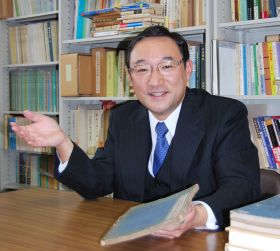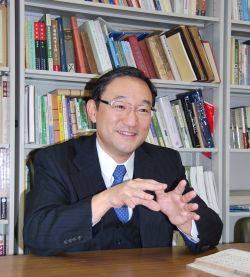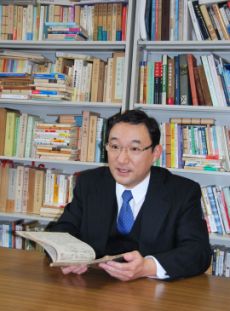Faculty Interview 03
OKI Yasushi (DEPARTMENT OF EAST ASIAN STUDIES (II) / Professor)

―― What are some of your present research interests?
I specialize in Chinese literature, particularly the literature of the Jiangnan region in the late Ming and early Qing periods. This was the period when not only the traditional literature written in classical Chinese, but the more popular novels and songs written in the vernacular language bloomed. It was around this period that tales such as the Sanguo Yanyi (Romance of the Three Kingdoms) and Shuihu zhuan (Water Margin) were compiled in the form that is widely read today. “Ordinary people” began to appear in literary works, and countless works that entertained such “ordinary people” as readers were sent out to the world through the print media. Presently, I am engaged in a work by a literati named Mao Xiang, titled Yingmeian Yiyu (Reminiscences of the Convent of Shadowy Plum Blossoms), in which he writes his memories of a concubine who passed away at a young age.
―― What led you to this particular work?
Ever since I wrote my undergraduate thesis, I had been studying the works by a man named Feng Menglong who is known to have been active in Suzhou during the last years of the Ming dynasty. In his works, courtesans (jinü) often play a significant role. As I studied more about courtesans, I came across Mao Xiang’s Reminiscences of the Convent of Shadowy Plum Blossoms and became interested in it. The concubine who passed away was a courtesan earlier in her life, and therefore, the work was a very useful source to learn about the lifestyle of courtesans at the time. Courtesans were the most cultured people at the time, and in the Reminiscences of the Convent of Shadowy Plum Blossoms, the author writes of appreciating poems and incenses together with her. Initially, I was using this work for the purpose of research. However, once I began reading it, I realized that it was written beautifully, and that the author Mao Xiang himself was an extremely interesting person. From there, I began finding all sorts of fascinating elements in the work that I could not help but dig deeper into it.

―― Speaking of which, in your own work, you choose the method of writing about a literary work not only from the author’s point of view, but from all different angles dealing with the social conditions of the time.
You’re right. For example, Feng Menglong is famous for a collection of his vernacular short novels, Sanyan but that does not mean that he was only working on Sanyan. Furthermore, one human being cannot be writing 24 hours a day or 365 days a year. I would like to capture a full view of the world in which they lived. In Feng Menglong’s case, I believe that we cannot fully appreciate and understand the meaning of his works unless we know about the printing business of the time, in which he was involved. The same can be said for themes such as courtesans and the civil service examinations. I would like to look at the social and cultural conditions of Jiangnan during this particular period of time, and after having done so, return to the characters and the works.
I also feel that I must go back to the more ancient world as well. I wish that this world and the classical and traditional literary world that one learns in kanbun (classical Chinese literature) classes will somehow link together. The intellectuals of the Ming and Qing dynasties have left literary works based upon the works preceding them. For instance, Mao Xiang loved Du Fu, and he composed many poems alluding to Du Fu’s poems. In order to understand what Mao Xiang was thinking, we must go all the way back to Du Fu. While my focus is fixed on Mao Xiang, I also wish to consider what the “classics” were for Mao Xiang and the intellectuals of his time.

―― In other words, you are attempting to observe the contemporary society, or even history as a whole, through the lenses of literary works and the characters therein. It sounds like you are going beyond the present boundaries of the field of literature.
After I finished my graduate studies, I became a research associate at the Institute of Oriental Culture. At one point, I gave a presentation to a group of research associates on Feng Menglong’s novels, and one colleague in a totally different field asked me “So you call this a ‘novel’?” (laugh). In the field of Chinese literature, we always talk about “Ming period novels (xiaoshuo).” To think of it, this was a fundamental question, and a pretty daunting one, too. I truly appreciated the opportunity to revisit issues that were taken for granted in our field from different points of view. In the Faculty of Letters, we are clearly divided among disciplines, such as literature and philosophy. The study of printing and the civil service examination that I have been involved in may actually be considered the task of a historian. However, the Institute provides us with the environment in which we are given opportunities to listen to different people and widen our views. I hope that it will continue to maintain this strongpoint. I hope we can create more opportunities as an Institute, where people from different fields can have an in-depth dialogue with each other.
―― Do you ever feel that your position as a scholar of literature is shaken?
I remember watching Chinese language lessons on TV for the first time when I was in junior high. Although I had no idea what they were saying, I had an impression that it was a beautiful language. That was one of the experiences that prompted me into the world of Chinese literature. With the Yingmeian Yiyu, too, I certainly must study the class system and other social elements in the background of the work, but the decisive factor that attracted my attention was that it so poignantly expresses the protagonist’s deep feelings toward his deceased consort. In the end, I wish to remain a literature buff. I believe that looking into the background and the surroundings is not a detour, but a necessary step in order to truly and more deeply understand a literary work.

